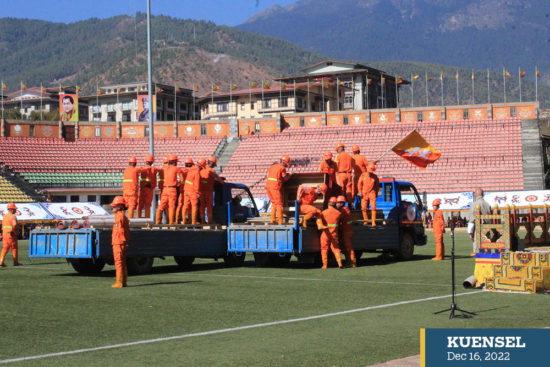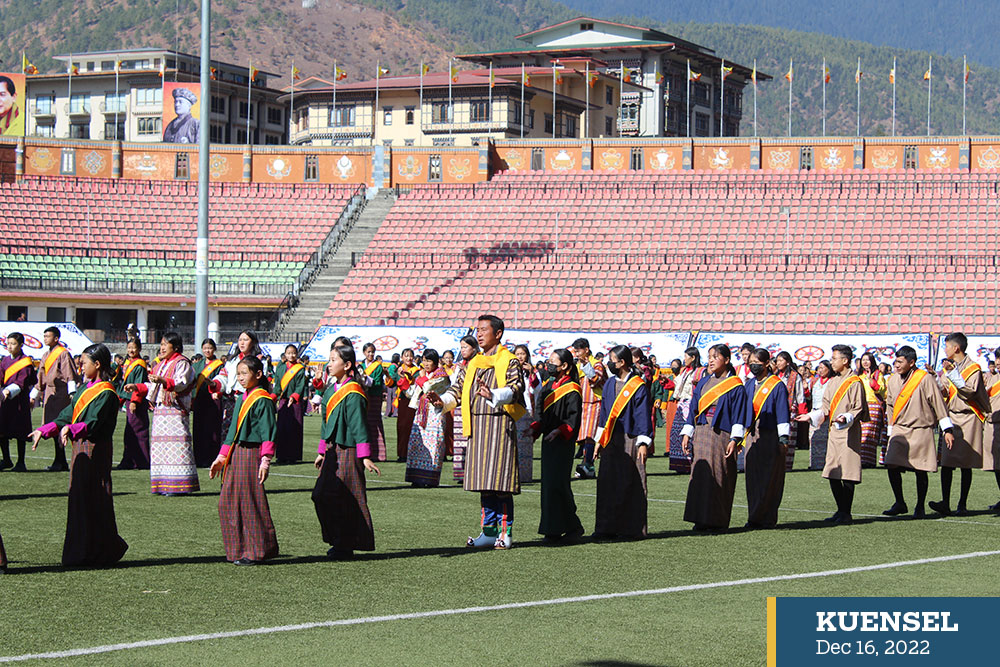… live popular band performance for the first time on National Day
Jigmi Wangdi
Thimphu streets are cleaned and houses hoist the national flag. Changlimithang is decked with fresh flags, decorations and scarves of all colours in preparation for the 115th National Day.
A group of elderly men watch the rehearsals through the fence as men, women, and children practice the cultural programmes. They strike up a conversation and agree that the celebration of National Day is a culmination of traditional skills, expertise, talent, and reverence of the highest order. It is a solemn, yet thrilling experience.
They discuss the rich symbolism of the decorations, the colours and their sequence, the gates and flags, the podiums and stadiums, and the processions and formalities. Every element of decoration and ceremony, from a simple flag to an elaborate gate, from an appliquéed tent to the Royal Pavilion, from the chipdrel procession to the marchang ceremony, is constructed or performed by experts.
This year, the National Day celebration at the Changlimithang will be no different as people from all walks of life come forward to make their personal or collective participation. The clergy, as usual, will play a key role in enhancing the spiritual atmosphere and advising on the religious aspects of the organisation.
After His Majesty The King’s address to the nation, the cultural and entertainment programmes begin.
 The cultural and entertainment committee’s member, Tshering Zangmo T, said that the boedra performance will be by dancers from the Royal Academy of Performing Arts (RAPA) and civil servants from the 10 ministries and autonomous agencies.
The cultural and entertainment committee’s member, Tshering Zangmo T, said that the boedra performance will be by dancers from the Royal Academy of Performing Arts (RAPA) and civil servants from the 10 ministries and autonomous agencies.
“There are 230 people who will be performing the boedra dance.
The song is newly composed by RAPA and is dedicated to His Majesty,” Tshering Zangmo T said.
The students from Thimphu Thromde schools will perform a rigsar dance.
“We have 561 students from private and government schools within Thimphu. They will dance to a newly composed song to celebrate our Monarchs. The cultural coordinators of the schools came together to compose the song,” the principal of RAPA said.
Volunteers from the five gewogs of Thimphu including elderly villagers will perform a zhungdra. RAPA Principal said that the highlanders of Soe and Lingzhi could not participate owing to their remote location.
“We have a mix of 100 participants from Genekha, Mewang, Dagala, Chang and Kawang gewogs who will be performing the zhungdra dance,” Tshering Zangmo T said.
De-suups will also demonstrate a drill as a part of the performances.
The cultural performance is expected to end around 11 am and right after it, the musical performances will begin.
What’s New?
The second part of the programme is a special addition, a first-ever live performance on a National Day by a mix of popular traditional and contemporary Bhutanese musicians and performers.
A stage will be put together, by the DeSuung Alpha Team, for the second half of the performance, and over 100 people will participate as performers and crew.
There will be around nine performances. Desuups will also be allocated in the stands to encourage the spectators to dance along the performances.
As a part of the celebration, Tashi Cell and Bhutan telecom will be providing a certain amount of free data package to all users on the day.
To attend the event at Changlingmithang, citizens are required to register through the Bhutan App. Citizens can register themselves and will be given a QR code that will be scanned by de-suups during entry. So far more than 20,000 citizens have registered for the National Day event.
Logistics arrangement
The RBP superintendent Colonel Namgay shared the security regulations on BBS. Items like knives or weapons of any kind and electronic equipment such as cameras will not be allowed. However, mobile phones will be permitted. Alcoholic beverages and umbrellas will not be permitted. The RBP may deny entry to any persons found with any object that is not permitted.
The security checks will be done at three locations for entry into the stadium: the Roundabout near BOD, Clock Tower, and the NPPF roundabout at Changlam. After clearing security checks, people will have to make their way to the stadium gates from one of these points on foot.
De-suups will be posted along the way to assist anyone who needs help. This is being done to avoid crowding at the stadium entry gates, where the entry ticket on Bhutan App will be scanned to let people in.
The police have also identified areas where citizens can park their vehicles. The designated areas are National Assembly parking, Royal Civil Service Commission parking, and parking at Lungtenzampa middle secondary school and Yangchenphug higher secondary school. The two multi-level parking in town will also be designated parking for the spectators.
There will also be around 25 city buses operating on the day. The police request citizens to use the bus service to avoid any inconvenience. There will be two buses operating from the parking at National Assembly, and one bus operating from the RCSC parking. The buses will also operate from areas in north and south Thimphu.
This will be the first time an event of this size is being organised since the Covid-19 pandemic. The Changlam road will be closed from today.
National Day
The National Day signifies the start of the most important era in the kingdom’s history: an era of unprecedented peace and tranquillity. This came with the birth of the institution of Monarchy.
On December 17, 1907, Gongsar Ugyen Wangchuck was elected by the Bhutanese people as the first hereditary King of Bhutan.
Ugen Wangchuck was a descendant of two of the most respected and highest lineages that went directly back to the great Terton (master discoverer of sacred treasures) Pema Lingpa. He was born in 1862 to Jigme Namgyel, the Penlop (governor) of Trongsa in central Bhutan and Azhi Pema Choekey. His father came from the Dungkhar Choeje (noble family) of Kurtoe district in eastern Bhutan while his mother belonged to the Byakar Dung lineage in the district of Bumthang in central Bhutan.
In 1874, when his father became the Deb (temporal ruler) of Bhutan, Ugyen Wangchuck was appointed as the Penlop of Paro in western Bhutan. After his father passed away Ugen Wangchuck became the Penlop of Trongsa. As Trongsa Penlop Ugyen Wangchuck, who was known for his extraordinary qualities of leadership and statesmanship, emerged as a towering figure among regional governors.
This was a time when the country was being ravaged by frequent internal strife because of the gradual weakening of the dual system of government that had administered Bhutan over the preceding two centuries. Recognizing Ugyen Wangchuck’s outstanding qualities as a leader and a statesman, the State Councillors, all the governors of the regions, the clergy and the people decided to elect him as King and establish the institution of hereditary Monarchy as the system of government best suited for a small country like Bhutan. Ugyen Wangchuck was enthroned in Punakha, the old capital of Bhutan.
This historic event laid the foundation for modem Bhutan. The institution of Monarchy brought peace, tranquillity and stability to Bhutan and the four successive Kings steered Bhutan through dramatic social and political changes, particularly during the second half of this century.


